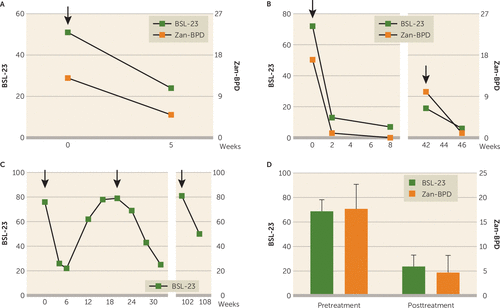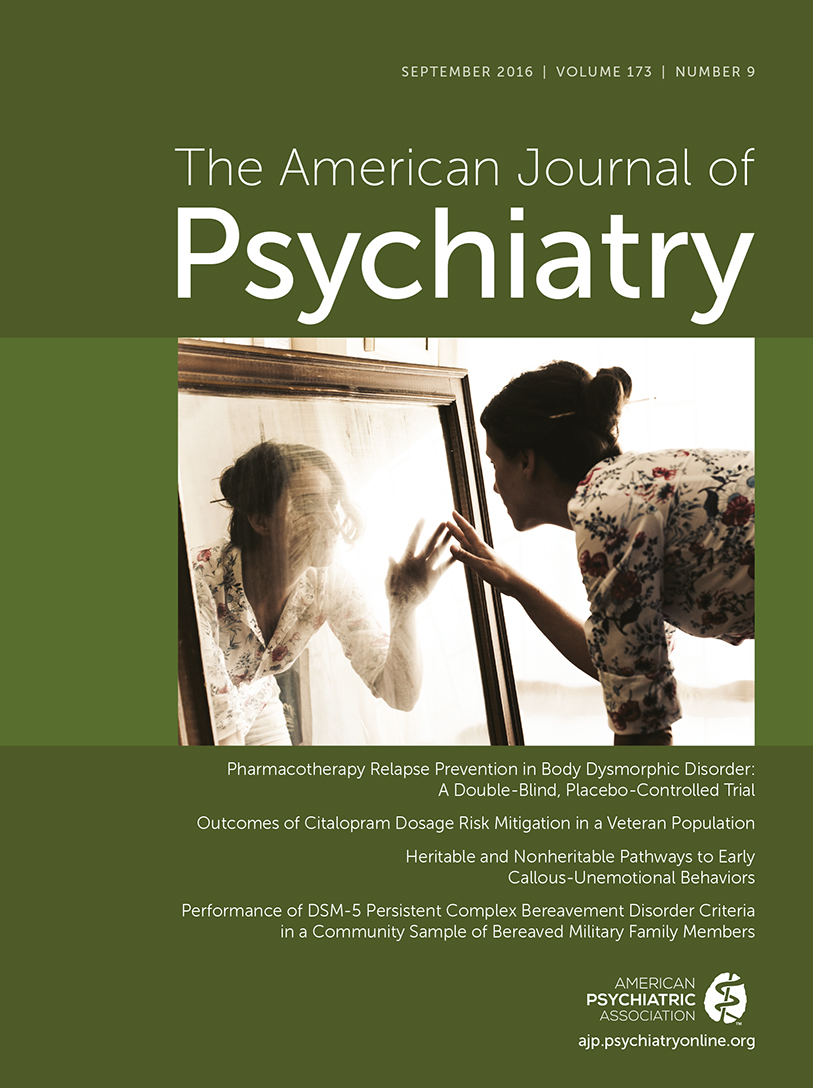Can Botulinum Toxin Help Patients With Borderline Personality Disorder?
To the Editor: Several randomized controlled trials have shown that a single treatment of botulinum toxin injections into the glabellar region (i.e., the muscles in the forehead) can improve the symptoms of major depression (1–4). How botulinum toxin exerts this mood-lifting effect is unknown. One possible mechanism of action is the interruption of a proprioceptive facial feedback loop that maintains and reinforces the depressed mood expressed by the contraction of these targeted muscles (5). The glabellar muscles, however, do not only express depressed mood but are centrally involved in the embodiment of all negative basic emotions; that is, sadness, anger, disgust, and fear. Could it not be that the glabellar injection of botulinum toxin does not specifically relieve depression but rather globally attenuates negative emotions associated with many psychiatric disorders? If this were true, patients with borderline personality disorder could be another target population for glabellar botulinum toxin injections because, among a host of other symptoms, they suffer from excessive negative emotions of any kind. Here we report the synopsis of six consecutive cases in which compassionate use of botulinum toxin led to a substantial reduction in the previously treatment-resistant symptoms of borderline personality disorder.
Female patients ages 20–59 years with a diagnosis of borderline personality disorder received botulinum toxin treatment with 29 U of onabotulinumtoxinA at five injection sites in the glabellar region during inpatient treatment between December 2012 and July 2015 at the Hannover Medical School (N=5) and at the Asklepios Clinic North–Ochsenzoll (N=1). In all six patients, previous and current pharmacological (antidepressants, antipsychotics) and psychotherapeutic (including dialectic behavioral therapy) treatment attempts had been insufficient. Two to 6 weeks following the injection of botulinum toxin, the symptoms of borderline personality disorder as measured by the Zanarini borderline personality disorder rating scale and/or the Borderline Symptom List had improved by 49%−94% from baseline values (Wilcoxon signed ranks test, p≤0.05; Figure 1). Patients also showed a reduction in impulsivity, self-harming behavior, agitation, and concomitant depressive symptoms as well as an improvement in social functioning. Four patients sought repetition of the treatment months later in an outpatient setting, which led to a replication of the clinical improvement.

FIGURE 1. Improvement of Borderline Personality Disorder Symptoms Following Glabellar Botulinum Toxin Treatmenta
a ↓=time point of botulinum toxin injection. (A) After unsuccessful dialectic behavioral therapy treatment, the 41-year-old patient received botulinum toxin injections. Within 5 weeks, the patient experienced a 50% reduction in severity of borderline personality disorder symptoms as measured by the Borderline Symptom List (BSL-23) and by the Zanarini borderline personality disorder rating scale (Zan-BPD). (B) This 20-year-old patient experienced almost complete remission of previously treatment-resistant borderline personality disorder symptoms within 2 weeks after botulinum toxin injection. Treatment success was replicated after partial recurrence of borderline personality disorder symptoms about 10 months later. (C) Previously treatment-resistant symptoms of borderline personality disorder responded well to botulinum toxin injection in a 28-year-old patient with comorbid social phobia. When the paralytic effect of botulinum toxin started to wear off after about 3 months, borderline personality disorder symptoms recurred but could be alleviated anew by reinjection of botulinum toxin. More than a year later, borderline personality disorder symptoms had worsened again and could be mitigated by botulinum toxin injection for a third time. (D) Nonparametric statistical analysis of baseline and posttreatment BSL-23 (N=6) and Zan-BPD (N=3) scores yield a significant improvement in borderline personality disorder symptoms following botulinum toxin injection (means±standard deviation; Wilcoxon signed ranks test, p≤0.05 for BSL-23; for individual scores see the data supplement that accompanies the online edition of this letter).
In this case series, we report the first clinical observations that glabellar injection of botulinum toxin may reduce the symptoms of borderline personality disorder. Taking the mechanism outlined above as a basis, botulinum toxin may dampen the whole spectrum of negative emotions and thereby equalize the pathognomonic emotional instability of borderline personality disorder. Consequently, botulinum toxin may also help to control impulsivity derived from overwhelming affect. Moreover, botulinum toxin may correct the negative bias in facial emotion recognition and diminish the hyperreactivity of the amygdala that occurs in the disorder at the mere sight of human faces (6–8). The treatment thereby may improve the disturbed social interactions characteristic of borderline personality disorder. Given the limitations and confounding factors associated with a preliminary casuistic study like this, these findings require verification in a randomized controlled proof of concept trial.
1 : Facing depression with botulinum toxin: a randomized controlled trial. J Psychiatr Res 2012; 46:574–581Crossref, Medline, Google Scholar
2 : Treatment of major depressive disorder using botulinum toxin A: a 24-week randomized, double-blind, placebo-controlled study. J Clin Psychiatry 2014; 75:837–844Crossref, Medline, Google Scholar
3 : Treatment of depression with onabotulinumtoxinA: a randomized, double-blind, placebo controlled trial. J Psychiatr Res 2014; 52:1–6Crossref, Medline, Google Scholar
4 : Treating depression with botulinum toxin: a pooled analysis of randomized controlled trials. Pharmacopsychiatry 2015; 48:205–210Crossref, Medline, Google Scholar
5 : Botulinum toxin and the facial feedback hypothesis: can looking better make you feel happier? J Am Acad Dermatol 2008; 58:1061–1072Crossref, Medline, Google Scholar
6 : Emotion recognition in borderline personality disorder: effects of emotional information on negative bias. Borderline Personal Disorder Emotion Dysregul 2015; 2:10Crossref, Medline, Google Scholar
7 : Amygdala hyperreactivity in borderline personality disorder: implications for emotional dysregulation. Biol Psychiatry 2003; 54:1284–1293Crossref, Medline, Google Scholar
8 : The link between facial feedback and neural activity within central circuitries of emotion: new insights from botulinum toxin-induced denervation of frown muscles. Cereb Cortex 2009; 19:537–542Crossref, Medline, Google Scholar



